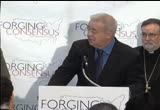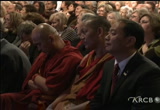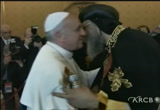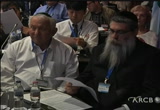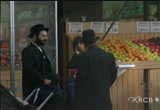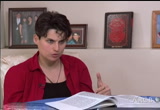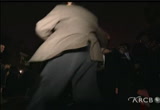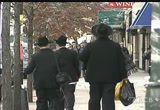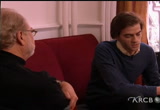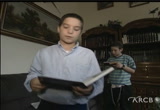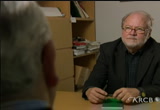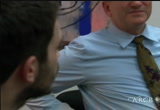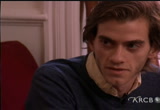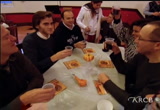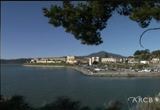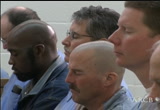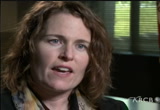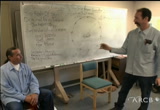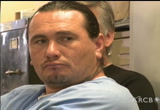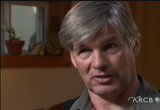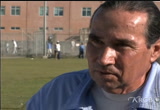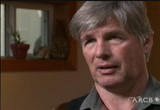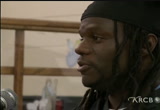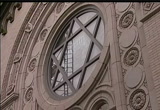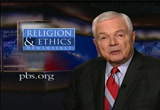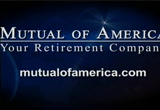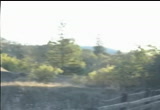tv Religion Ethics Newsweekly PBS May 12, 2013 10:00am-10:31am PDT
10:00 am
coming up, lucky severson on the insular world of the ultra-orthodox hasidic jews. leaving that world is not easy, and some of those who do risk being ostracized, even by their own families. also, kate olson on turning violent criminals at san quentin prison into peacemakers, through therapy and meditation. >> major funding for "religion
10:01 am
and ethics weekly" is provided by the lillian endowment, dedicated to its founder's interest in religion, community development and education. additional funding also provided by mutual of america, designing customized, individual and group retirement products. that's why we're your retirement company. and the corporation for public broadcasting. welcome, i'm bob abernethy. it's good to have you with us. as the senate judiciary committee began debate on immigration legislation this week, many religious groups intensified their ongoing calls for comprehensive reform. evangelical leaders, who have lobbied for new immigration policy, launched a prayer campaign urging congress to pass a law in 92 days, which they said reflects the number of times the word "immigrant" appears in the old testament. but some of those same leaders
10:02 am
warned they would oppose the bill if it includes amendments th wou expand imgratn rights for gay and lesbian partners. the u.s. catholics bishops are ramping up their opposition to same-sex marriage, as the number of states recognizing it continues to grow. delaware this week became the 11th state to legalize same-sex marriage. in a new church bulletin insert that will be given to catholics around the country, the bishops urge prayer for the protection of "traditional marriage." the dalai lama began a six-city u.s. tour by strongly condemning inter-religious violence. he specifically included the recent conflict between buddhists and muslims in myanmar. speaking at the university of maryland, the tibetan buddhist leader said such fighting, like that between sunnis and shiites in iraq or catholics and protestants in northern ireland, is motivated by political and economic factors, not religion.
10:03 am
he said all the major faith traditions have a message of peace. despite that message, there were seral new oureakof interfaith violence around the world this week. in nigeria, at least ten people died in an attack on a church and a nearby market, the latest in a long series of attacks by islamist extremists who often target christians. in tanzania, at least two people were killed and dozens injured in a bombing during the dedication of a new catholic church. and in bangladesh, at least 22 died in clashes between police and muslims who were rallying in support of anti-blasphemy laws. rising attacks against christians in egypt was a major topic of discussion as coptic pope tawadros ii met with roman catholic pope francis at the vatican friday. it was the first time in 40 years that a coptic pope has
10:04 am
visited the holy see. tawadros has sharply criticized muslim brotherhood government leaders in egypt for not doing enough to protect the coptic community there. in israel, police detained the highest-ranking muslim cleric in the holy land for several hours this week amid ongoing tensions over the most disputed religious site in jerusalem. israeli officials said they questioned the grand mufti of jerusalem, sheikh mohammed hussein, about recent violence near the al- aqsa mosque, which is located on the site jews revere as the temple mount. the mufti was released without charge. delegates to the world jewish congress meeting in hungary this week raised nces about the rapid rise of anti-semitism in many parts of europe. they called on european
10:05 am
governments to crack down against far-right, neonazi parties that promote anti-jewish rhetoric. we have a lucky severson report now on the large number of ultra orthodox hasidic jews living in tightly knit communities in and around new york city. most of these hasidim are content with the piety and traditions of the lives into which they were born, but some choose to leave, often at a high emotional price. >> reporter: they live conspicuously pious lives in a secular world, especially in enclaves and suburbs of new york. ultra orthodox hasidic jews observe the strict rules of the torah, the first five books of the hebrew bible, and its 613 commandments. their structured lifestyle seems to work for the majority. but, for some, the lack of choices is too rigid, so they choose to leave, even though doing so can be very painful. hasidic groups remain some of the most insular religious sects
10:06 am
in the u.s. sol feuerwerker knows, he was one of them. >> i think that's what surprises most people, you know, most outsiders, is that how can something this insular be happening right here in the middle of new york city. you know, as i've moved farther away from it, it kind of shocks me too actually. >> when i tell people that i grew up 30 miles north of new york, that i went into the city and i had never seen a movie before i was in my 20s, they thk i'm insane. >> reporter: chani getter grew up, married and had three children before she broke away from her hasidic community. those who leave hasidism paint a picture of a very puritanical and sheltered way of life. >> when i left, i moved into my own apartment and i started driving, and as a woman who was driving, my parents disowned me. in our sect, women did not drive. and so, for eight years, they
10:07 am
didn't talk to me. >> reporter: in hebrew, the word hasidim translates to mean the "pious ones." they are defined by their devotion to a hereditary leader known as the "rebbe", by their distinctive clothing and yiddish language. professor samuel heilman is a jewish scholar at queens college. >> they have everything that makes up a culture, social norms, language, a career pattern in life. even the ones who leave say that there are aspects of their lives that they left behind that they miss. to go to a hasidic gathering and to sing the songs and to dance in the circle and to be enfolded into the community, and to hear your voice in a chorus of other voices. this is a tremendously exciting
10:08 am
experience. and when you leave and you're all alone, all alone in the city. >> reporter: professor heilman says there are as many as 350,000 hasidic orthodox in the u.s. and canada, and an even larger population in israel. and the numbers are increasing fast, he says, because hasidism strongly encourages very large families. >> they don't believe in birth control. they believe that the commandment of "be fruitful and multiply" is incumbent upon all jewish people and they practice it. not only do they have large famies but they are the poorest of all jews because they don't go to college, so they lack often some of the skills that are necessary for high income. they are all literate in jewish education, but their secular education is limited.
10:09 am
that is not to say there are not some who are successful in the diamond business, electronics business, in trading on wall street. >> reporter: relatively few leave, in professor heilman's view, because they've been taught to shun the secular world. >> they've been told that the world outside their own is demonic, corrosive, dangerous, they wouldn't want to be part of it, that they live a superior kind of life. >> one of the things that they teach you is that we get to choose what we allow our eyes to see. we get to choose what we allow our ears to hear. and so when you go into the city, you make a conscious choice not to allow your eyes to see. >> there's this whole, like belief or narrative in the community that if you -- if you try to break away or change, you will fail and you won't be
10:10 am
hardship and you'll just end up on drugs. >> reporter: lani santo is the executive director of a non-profit group called footsteps, founded in 2003, not to proselytize but to provide counsel and support to those who want to explore life outside the confines of the world in which they were raised. they've assisted over 700 altogether so far, a majority are young men. >> i mean my mother still hasn't called me. my mother hasn't spoken to me this whole time. >> we are seeing a lot more, just in this year alone, we've seen a 60% increase in our membership and in new people coming to us, and that's compared to a 35% increase that we've been on for the last few years. >> reporter: in the past, it was easier to shelter those in ultra- religious communities from the outside world. television, magazines, radio, even libraries were off limits. then along came the internet. >> the internet is a real probl for them.
10:11 am
there has been -- there have been efforts, for example there was a recent gathering at citi field here in new york that was against the internet. but it's a case of trying to close the barn after the horses are out. >> reporter: lani santo says those who do leave suffer serious bouts of loneliness and guilt. >> it's more about guilt in terms of impacting their families. if they have younger siblings, the fact that they're leaving is putting at risk the marriage prospects for their younger siblings d th's a real challenge. >> marriage is critical. and it's all by matchmaking. finding single people in this community is rare, and if they're single then it means they're problematic, and problematic can be that you have someone in the family who's not orthodox or that there's some mental or physical ailment in
10:12 am
the family, or that there are -- it can even be somebody has too many people with red hair in the family. >> any mark of difference is a mashe. o whetr it's a mark of having chi that's leaving the ity, wh of having a child that's sexually abused or whether there's some sort of ailment in the family, or someone who's committed suicide, all of that will be covered up. >> the first thing that really struck me was the courage in the room. >> reporter: michael jenkins is footsteps' senior social worker. he says he's amazed at the risks young hasidim are taking by even walking through the front door. he conducts group therapy and private counseling, says a number of people he meets with lead dual and deeply conflicted lives, with one foot in their hasidic community and one foot out. >> there's things in the community that i love, that work for me, family, friendships, relationships. this is where i've always been and this is where i want to be,
10:13 am
yet there are things that i disagree with and i want to be able to talk about that or express that somewhere else. >> i want to be who i want to be. and if i find god, i find god on my own, you know? i don't go any more according to what i was told as a kid. >> reporter: in hasidic communities, young men study the torah in hebrew at least seven hours a day and spend only one hour on secular education. so those who leave are woefully unprepared to go out on their own. sol was 19 when he broke away. >> what was your education level at that point? >> if had to estimate it would probably be, you know fourth or fifth grade. >> reporter: was that pretty standard for most of the men of your age? >> that's the the norm, yeah.
10:14 am
and in fact i believe i was actually a little bit more advanced than some of my friends at the time. >> reporter: another consequence of the insularity is that if a crime is committed, it often goes unreported. >> i have many friends, men and women who have been abused, sexually, physically, emotionally. >> reporter: sol is now in his fourth year as a pre-med student. he says it hasn't been easy. some old friends speak to him, some don't. he says he has a message for others who are worried about leaving the sheltered world of hasidism. >> my point is it's challenging and it looks really, really scary at the beginning. but it's possible. >> reporter: as the world continues to shrink because of access to modern technology, like the internet, it's becoming increasingly difficult for anyone or any group to shield their families from the outside
10:15 am
world. for "religion and ethics newsweekly," i'm lucky severson in new york. now, a special report from san quentin prison, in california, where there are 66 separate programs trying in various ys thelpriminals discover and overcome the root causes of their violence. kate olson reports on one of them, called grip, for guiding rage into power. it's an apparently effective combination of group psychotherapy and the contemplative traditions of many religions. >> reporter: for most of its 160 year history, san quentin has been known as a tough place to do hard time. but over the past two decades, this has begun to change.
10:16 am
thanks to thousands of engaged citizens in the surrounding community, a growing number of innovative programs aimed at reducing violence and recidivism are having an impact. one of those programs was started by this man, jacques verduin. >> there's a growing alienation and a lack of sense of belonging for most people in society. it seemed that nowhere else stronger than in our prison system had we turned our backs on each other. >> reporter: a psychologist who has practiced meditation for many years, verduin created a program called grip-guiding rage into power. the year-long initiative seeks to help prisoners address the root causes of their violent behavior and make the journey of transformation from violent offender to peacemaker, from the inside out.
10:17 am
>> is home just four walls and a roof on the outside? or is it a state of mind as well? can you go home before you leave? can you leave prison before you get out? >> the reality is that the parole board does not grant parole very easily. so for many of them they don't actually know when they will get out of prison. and i think what the grip program has done is offered them a way to not be trapped by that, to realize that they're living their lives now, that they're still part of a community. it's not the community outside the prison but it's the community inside the prison. >> reporter: elizabeth siggins, who visited san quentin the day we werthere, is a senior policy adviser in the department of corrections and rehabilitation for the state of california. >> when you work in a prison system, you don't think that you're going to go sit in a group of offenders and close your eyes. and when i was sitting there today i thought, i feel safe. >> reporter: creating this safe
10:18 am
environment ise responsibility of the prisoners who understand that the program belongs to them. >> my name is robin, and i'm a peacemaker. >> reporter: fellow inmates, like robin guillen, who are graduates of the program, guide the weekly sessions. >> that's part of what we explore here and discover about ourselves on why we acted violently. >> reporter: guillen has served 40 years in prison, 20 of them here at san quentin, for a murder he committed at age 17. after witnessing a stabbing outside his cell, he made a decision to turn his life around beginning with facing his painful past. >> can you go back to the very first time, the very first time that you witnessed trauma or pain in your life? >> my father and my cousin were in a fight in the living room. my father stabbed the cousin in the living room many times.
10:19 am
and i'm sitting there, crying, blood-kurd curdling krooim cries, out of sheer fear, terror. that was the first experience of original pain. >> reporter: to help the new class of prisoners understand how pain and suffering from their past can trigger violent behavior, robin prompted others to share their experience. >> how many of you suffered from trauma early on in life, as far back as you can remember, as an adolescent, as a little one? >> early on in my life, you know, everything you do you get hit. it was just something to me that happened just normal. if you go to school late, you get a whipping. if you come home late, you get a whipping. those things taught me how to be aggressive and hurtful towards another human being.
10:20 am
>> see if you can connect the emotional feeling with some sensation in your body. >> reporter: through a practice called "sittin the fe" the inmates learn to face painful emotions from their past. >> so breathing in, i welcome this feeling. i feel this fear, this grief, this anxiety. >> in my experience in working in san quentin, i saw that it was often difficult strong emotions that propelled people in a life of crime and addiction and trying to medicate what you could otherwise process. "sitting in the fire" in essence, basically is a movement of responsibility, where you say, "the causes and the origins of this feeling lie within me," so you can stop blaming. >> and see that's the whole piece, is to be able to feel what's going on, to be able to
10:21 am
really address, internally, what is this feeling? where is it coming from? and how i'm going to respond versus react. >> reporter: focusing on the breath, this practice draws on the contemplative tradition in many of the world's religions. >> we talk a lot about breath and spirit being the same thing. so to sit in the portal of feeling the movement of breath, of spirit as it enters and passes through, is a practice that orients us on a very deep level. >> it's kind of like you know sitting with myself and allowing god to love me. you know, things may not be all good all the time, but you have something to draw from. you can ground yourself and breathe. >> reporter: making amends to families of their victims is also part of the journey in grip, and to the experience of inner freedom for guillen.
10:22 am
>> i have character defects, flaws, and i'm imperfect. but i have a walk and i have a commitment to honor. and to honor those people that i've hurt. and i have something to give. and i could either give it in here, or i could give it out there. >> this is 52 weeks of very difficult self-exploration. not only do the facilitators hold the men accountable, they do hold each other accountable, and ultimately, the success of the program is whether or not after they're done they really do stick to that commitment of non-violence. >> i think it's an enormous gift to a community to bring back groups of men that have been imprisoned and the gift is to say, these are safe men. not only will they not create conflict and violence in your community, they can help resolve
10:23 am
it and de-escalate it. >> reporter: this gift was evident in the testimonies at the graduation ceremony of last year's grip class. >> my name is vaughan. i've been incarcerated for 18 years for taking the life of kneeck. through all that hurt and you accept that responsibility for that, they got a part in there called "sitting in the fire," so you sit through all them emotions and i got to see all the ugly that i did. also what it helped me do is to look back and find my authentic self, to look back at that kid that used to cry when his hamster died and allow that person right there to come forth and shine and guide me. and if i can stop another kneeck from being murdered and another vaughan from murdering somebody, then i did my job.
10:24 am
[ applause ] >> derrick cooper. >> reporter: the "diploma" the graduates received is their pledge to a code of attitudes and behavior to turn a life of violence into being a peacemaker. in a closing ritual, supporters welcomed the graduates into the community as peacemakers, ready to give back. for "religion and ethics newsweekly," this is kate olson reporting from san quentin. on our calendar, the jewish holiday of shavuot begins at sundown on tuesday. shavuot commemorates the giving of the torah to moses on mount sinai. some jews gather in synagogues and homes to study the torah all night long.
10:25 am
the holiday is also a harvest festival, which many celebrate by eating rich dairy foods, like cheesecake. finally, prominent evangelical philosopher dallas willard died this week, just days after revealing he had been diagnosed with cancer. he was 77. the longtime university of southern california professor wrote several books on christian thought and formation, including his best-selling, "the divine cspiracy." that's our program for now. i'm bob abernethy. you can follow us on twitter and facebook and watch us anytime on the pbs app for iphones and ipads. there's always more on our website. audio and video podcasts are also available. join us at pbs.org. as we leave you, music from a recent service at howard university in washington, d.c.
10:26 am
♪ major funding for "religion and ethics "newsweek"ly" is provided by the lily endowment, dedicated to its founders' interests in religion, community development and education. additional funding also provided by mutual of america, designing customized, individual and group retirement products. that's why we're your retirement company. and the corporation for public broadcasting.
10:30 am
barry kibrick: today on "between the lines," how a man's relationship with his father shapes his life, with my guest larry elder. welcome, i'm barry kibrick. larry is an author and radio talk show host who loves to shake up the status quo. a past guest on this program, larry now with his latest book, "dear father, dear son," shares a most intimate story of how one man discovered a son he never really knew and a son who found a man, friend and father he never realized had been there all along. guest: i'm a writer today because i was a reader. when i was 11 years old and it was... guest: you do not need to prove your state of happiness to anybody. guest: mos t
294 Views
IN COLLECTIONS
KRCB (PBS) Television Archive
Television Archive  Television Archive News Search Service
Television Archive News Search Service 
Uploaded by TV Archive on

 Live Music Archive
Live Music Archive Librivox Free Audio
Librivox Free Audio Metropolitan Museum
Metropolitan Museum Cleveland Museum of Art
Cleveland Museum of Art Internet Arcade
Internet Arcade Console Living Room
Console Living Room Books to Borrow
Books to Borrow Open Library
Open Library TV News
TV News Understanding 9/11
Understanding 9/11

